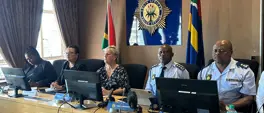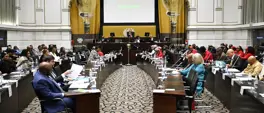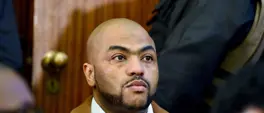CHARLES MATSEKE | National Dialogue risks failing before it begins
Charles Matseke
14 August 2025 | 10:59"The Dialogue will be judged not by the eloquence of its opening speeches but by the tangible changes it produces. Inclusion must be more than a box-ticking exercise; it must be substantive, giving real voice to those outside elite political circles."
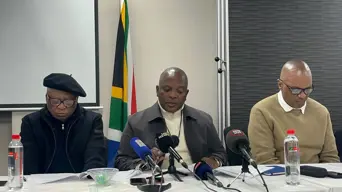
The task team appointed to prepare for the National Dialogue held a media briefing in Johannesburg on Friday, 13 June 2025, to explain the planning process. Picture: Alpha Ramushwana/EWN
South Africa is once again being summoned to a grand table of promises, where the rhetoric of renewal threatens to drown in the murky waters of political expediency. The much-anticipated National Dialogue, marketed as a panacea for our battered constitutional order, is set to cost the public purse an eye-watering R700 million.
This, we are told, is the price of reconciliation, renewal, and recommitment to the ideals of our democracy. But the timing, design, and political choreography of this Dialogue suggest it may be less a cure than a costly diversion, a ceremonial gesture masquerading as reform.
The preparatory convention, scheduled for 15 August 2025, mirrors the very uncertainty and dysfunction it is meant to confront. It is no accident that the Democratic Alliance, former President Thabo Mbeki, and several of his aligned forces have opted out, preferring the dignity of principled absence over the indignity of co-option into a clique. Their withdrawal is a political signal: a process that should belong to the people is in danger of becoming an elite ritual.
The symmetry between this National Dialogue and the recent Summit of African Liberation Movements is telling. Both are framed as historic reckonings. Both promise to examine the legacy of political struggle and chart a renewed vision for governance.
And both, if they fail to uphold citizen-centric values, face a crisis of purpose. While liberation movements gather inwardly, seeking renewal within their own political DNA, the National Dialogue must resist the gravitational pull of factionalism. Unless it is genuinely citizen-led, it risks becoming the very problem it claims to solve.
Robert O. Paxton, in The Anatomy of Fascism, warns that corrupt political movements do not seize power through a single dramatic coup, but through incremental compromises, captured institutions, and the normalisation of bad faith politics. South Africa’s political elite, consciously or not, seem intent on rehearsing this playbook, dressing up institutional decay in the language of “engagement” and “renewal.”
The R700 million budget for this Dialogue is drawn from a state that already fails to deliver basic services. Roads crumble, hospitals run short of critical supplies, and schools remain unsafe, yet vast sums are allocated to talk about fixing precisely those failures.
As with the commissions of inquiry before it, the state appears more comfortable funding conversations about problems than confronting the powerful interests that cause them.
This is, as Daron Acemoglu and James Robinson would argue in Why Nations Fail, a classic symptom of extractive political institutions: structures that serve elites while draining public resources, eroding trust, and ultimately hastening national decline.
It is now becoming clear that in South Africa, political authority lost its legitimacy when the state ceased to act in the collective interest. The gap between constitutional promise and lived reality is widening into a chasm.
The idea of a National Dialogue is noble only if it embodies the public will and restores the moral core of governance. But when such processes are choreographed from above, excluding dissenting voices and over-representing party loyalists, they violate the very contract they claim to renew.
Notably, the central authority’s primary duty is to prevent societal collapse into a “war of all against all.” That duty requires competence, fairness, and the protection of the commons. A Dialogue that is merely performative risks accelerating the breakdown of that authority. Citizens already fatigued by the unfulfilled promises of previous inquiries will view it as yet another elite exercise in self-preservation.
“Beware the one-party state” and “Defend institutions.” South Africa is not yet an outright one-party state, but the dominance of the ANC, combined with its entrenched patronage networks, makes it dangerously close. If the Dialogue becomes another instrument of that dominance, it will weaken, not strengthen, the very institutions it claims to defend.
The ANC’s role here cannot be divorced from the recent Liberation Movements Summit, which despite being cloaked in the language of continental solidarity, was largely an exercise in political nostalgia. While some genuine conversations emerged about political integrity and youth engagement, much of it was inward-looking, more concerned with party survival than citizen empowerment.
The National Dialogue now stands at a similar crossroads: it can either mirror the Summit’s occasional flashes of principle, or it can sink into the same cycle of self-referential grandstanding.
If the National Dialogue is to have any meaning, it must be grounded in this recognition. It must avoid the fate of the commissions that came before it, which were voluminous in their findings, toothless in their impact.
The Dialogue must name and confront the political mafias that Timothy Snyder would identify as proto-authoritarian actors: those who capture institutions, intimidate dissent, and erode democratic norms from within.
The urgency is plain. South Africa’s youth, who comprise the majority of our population, have grown up in a democracy they were told was hard-won, yet which delivers little of the freedom it promised.
To them, the Dialogue will be judged not by the eloquence of its opening speeches but by the tangible changes it produces. Inclusion must be more than a box-ticking exercise; it must be substantive, giving real voice to those outside elite political circles.
If South Africa fails to mirror the best instincts of the Liberation Movements Summit, its calls, however imperfect, for integrity, inclusivity, and youth engagement, the Dialogue will be hollow. And hollow processes are dangerous: they breed cynicism, alienate citizens, and create the perfect vacuum for authoritarian tendencies to grow.
Ultimately, this is not about R700 million alone. It is about political will, moral courage, and the humility to admit that trust in governance is not restored by stage-managed conversations. As Acemoglu and Robinson remind us, nations fail when leaders design institutions that perpetuate their own power instead of serving their citizens.
The question, then, is not whether we can afford R700 million for a Dialogue. It is whether we can afford another performance of reform without the reality of change.
Get the whole picture 💡
Take a look at the topic timeline for all related articles.
Trending News
More in Opinion
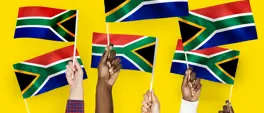
3 March 2026 11:40
Who belongs in South Africa? UCT philosopher weighs in on identity and ownership
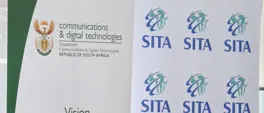
2 March 2026 11:05
TLALI TLALI |Mandate, money and accountability - What the government website debate really reveals

27 February 2026 11:00
JAMIL F. KHAN | Human rights last on the list for global leadership agenda


